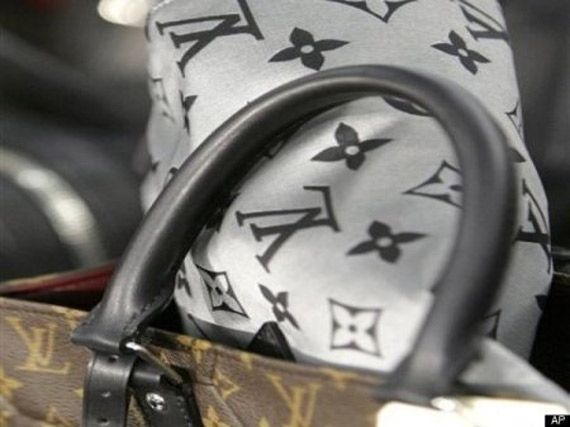
Photo Credit: Huffington Post/AP
All the latest from on-going counterfeit, copyright and patent disputes, instigated by Louis Vuitton, Hermès, Richemont, Christian Louboutin & Gucci
For the modern luxury brand, the accessory du jour has shifted from a game of creative-director musical chairs, to the instigation of an intellectual property lawsuit. Legal proceedings are far from innovative in an industry driven by brand equity, design, craftsmanship and hallmarks, but recently everyone from Christian Louboutin to Hermès to Richemont have been battling everyone from Yves Saint Laurent to online counterfeiters to Russia’s patent authorities.
Counterfeit Complications: Hermès, LVMH Hermès International SCA recently won a judgment against 34 websites that sold fake copies of its luxury goods and was awarded approximately $100 million in damages.
U.S. District Judge Denise Cote in New York ruled that the sites – with names like HermesBags-Outlet.net, HermesBirkin-Bags.org and HermesOutletStore.Com – sold items that infringed upon at least nine Hermes products, including the iconic Birkin and Kelly handbags.
The sites chose not to defend themselves in court, after disregarding previous temporary orders restraining them from selling counterfeit items, but were nonetheless deemed liable for federal trademark counterfeiting and infringement.
In the latest episode of a legal dispute initiated in 2006, the French high court has partly overturned rulings against eBay from 2008, when LVMH accused the online marketplace of breaching distribution networks and selling counterfeit goods.
eBay was originally fined €38 million and ordered to block sales of genuine perfume of the LVMH brands Christian Dior, Kenzo, Givenchy and Guerlain. An appeal court cut the fine to €5 million in 2010, and this latest ruling will send the case back to a lower appeal court to rule on eBay’s French and U.K. sites.
eBay is said to have “welcomed” the latest ruling in its on-going battle with LVMH and expects that the €5 million damages will be reduced. eBay is said to believe that the lawsuits are a way for luxury brands to tarnish eBay’s own image and control who sells luxury products and at what price.

Mistaken Identity: Richemont, Russia
In Russia, Richemont has continued to challenge a local organisation by the name of Ritter Gentleman LLC, which registered the trademarks “Vacheron Constantin” and “Jaeger Lecoultre” and proceeded to make mid-priced clothes under the labels.
Richemont contested the registration in a Russian court, which decided that Ritter did not violate trademark law based on category, because clothing and watches are different products. Unsatisfied with this decision, the Swiss conglomerate re-mounted its case based upon another section of patent law, which deems dual-brand registration unacceptable if it is confusing to the consumer.
Richemont went on to win the case in the Russian Supreme court, where 12 sitting justices unanimously agreed that a well-known trademark in another country may not be co-opted and applied to different goods in the local country because it is confusing to the consumer and unfairly trades on reputation. They also ordered Rospatent, the Russian Patent authority, to cancel the bad faith trademark registration of the defendant.
Inspiration vs Infringement: Gucci, Guess
Gucci America instigated legal proceedings against Guess back in 2009, complaining that Guess knocked off their “G” logos and other Gucci-esque designs. The case only recently made it to court, where the stalwart of PPR’s luxury stable claimed that $221 million worth of Guess products infringed Gucci designs.
Guess was accused of selling items that are “studied imitations of the Gucci trademarks,” including a green and red stripe design, a square G, the designer’s name in flowing script and a diamond pattern with repeating interlocking G’s.
In his closing argument, Daniel Petrocelli, defence lawyer for Guess, argued that his client’s products simply didn’t infringe on any of Gucci’s “weak trademarks,” primarily because other brands had similar designs. Gucci’s decision to only now take action, despite concerns about Guess making Gucci knockoffs for over 20 years, was also called into question.

Seeing Red: Christian Louboutin, Yves Saint Laurent
In August 2010, Christian Louboutin’s request for an injunction to stop sales of red-soled shoes made by Yves Saint Laurent was denied on the basis that Louboutin wasn’t able to prove that its red soles deserve trademark protection. This was despite the brand being awarded a trademark for the red sole in 2008, by the U.S. Patent and Trademark Office.
The decision was criticised by Susan Scafidi, director of Fordham University’s Fashion Law institute, who described Yves Saint Laurent’s use of the red-coloured sole as “identity theft.” Going on to explain to WWD that “the philosophical question is, if it doesn’t have a red sole, is it a Louboutin? If the shoe has house designs on it, yes, but the question is, will the public see it that way?”
Louboutin sought to overturn the ruling in January 2012, but the new panel of judges has yet to issue a decision. “What PPR does via Yves Saint Laurent is breaking my trademark, which I find incredibly offensive," remarked Mr. Louboutin himself recently to the The Associated Press. "I do not own a color. I own a specific colour in a specific place.”
See The Best Luxury Brands









